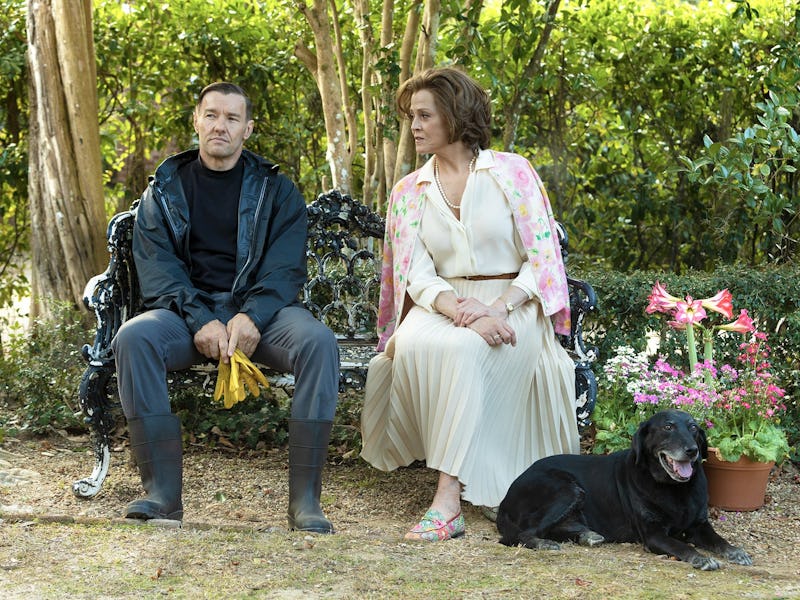Master Gardener Finally Gives Its Tortured Soul Some Catharsis
Paul Schrader goes gothic and surprisingly hopeful in his latest crime drama.

Give Paul Schrader a genre in which he can stick an alienated, angry man disillusioned with the modern world, and he'll give you a modern classic — or at least, something close to it. The First Reformed director has honed and perfected the lone-wolf revenge thriller since he penned Scorsese's landmark masterwork Taxi Driver, finding new ways to probe emerging social anxieties in the most exhilaratingly transgressive ways. But rarely has he been as sentimental as he is in Master Gardener.
After having tackled climate change anxiety in First Reformed and veteran PTSD in The Card Counter, Schrader now aims his lens at white supremacy. But Master Gardener feels less like a new riff on Schrader's classic lone-wolf narrative than it does a quietly sweet gothic love story. It's a fitting conclusion to Schrader's loose "Man in a Room" trilogy, that the deeply tortured, deeply flawed protagonist can finally find redemption in something so tender and common as love.
Master Gardener is a surprising gothic romance.
Master Gardener stars Joel Edgerton as Narvel Roth, a quiet and disciplined horticulturist. Narvel works at Gracewood Gardens, the beautiful estate owned by wealthy dowager Mrs. Haverhill (a chilling Sigourney Weaver). When he's not commanding a team of expert gardeners who lovingly tend to Gracewood, he's warming the ego and bed of Mrs. Haverhill or waxing poetic about the wonders of plant life in his journal. But his meticulous life is thrown for a loop when Mrs. Haverhill requests that he take her grand-niece Maya (Quintessa Swindell) under his wing as an apprentice after Maya's mother dies of an overdose. She's mixed, Mrs. Haverhill says, with a barely-concealed venom, hoping his tutelage can shape Maya into a proper heir to Gracewood Gardens.
When Maya arrives, sporting a tie-dye T-shirt that says, "No bad vibes," she's a shock of modernity to the stuck-in-time Gracewood Gardens, and a jolt that seems to slowly reawaken the sleepwalking Narvel. Soon his long, monotonous narration about plant cultivation is interrupted by violent memories — a trigger pulled, a bomb going off, a bullet in the skull. As Narvel and Maya grow closer and Mrs. Haverhill becomes more envious, Maya's dangerous affiliations and Narvel's dark past as a white supremacist hitman head toward a bloody collision.
The setting immediately sets the stage for the surprising gothic undertones of Master Gardener, which eschews the neo-noir structure of Schrader's previous two films in favor of something moodier, shaggier, and a bit soapier. The greatest embodiment of this is Narvel himself. Though Narvel shares many similarities with the protagonists of First Reformed and The Card Counter (primarily their shared affection for diligently logging their deep, dark thoughts in dimly lit rooms), he has more in common with the Byronic heroes of the Brontë sisters: the mercurial hero of foul moods and surprisingly sweet affections.
Edgerton plays Narvel as slightly shy and uncertain, with a gentleness that doesn't fade even when his violent past is slowly unveiled. His tortured hero has accepted his punishment and doesn’t think himself deserving of redemption. It’s a far cry from the disaffected, angry young men of Schrader’s early career, but a cathartic evolution of the two previous doomed protagonists of Schrader’s “Man in a Room” trilogy. As familiar as these tropes are — the tortured soul, the pure-spirited younger romantic foil who can absolve him, the violence he’s tempted to re-embrace in the name of protection — Master Gardener imbues them with a warmth that is almost refreshing, especially considering Schrader’s own misanthropic reputation.
Quintessa Swindell feels like a real discovery in Master Gardener.
Though Master Gardener is very much a showcase for Edgerton, it’s in parts a two-hander with Quintessa Swindell’s Maya. Swindell may have already made their tentpole debut in Black Adam, but they feel like a real discovery here — a sort of extension of Jodie Foster's waifish Taxi Driver character but with a personality, a past, and a post-millennial edge. Swindell and Edgerton share an endearingly timid connection that plays out in tiny gestures and glances, and almost feels too small for the explosive way Master Gardener escalates in its third act.
Master Gardener sits at a crossroads for Schrader, positioned somewhat uncomfortably between the gothic genre and his own noirish impulses. It’s spare, meditative, and distant, playing out mostly in wide angles and long, static shots that cross-fade into surreal visions of flowers and earth. But occasionally, like Narvel’s own subconscious, it’s interrupted by bursts of violence and blood, as if Schrader can’t help but return to his old habits. This becomes most evident in the third act, which takes a slightly predictable turn as Narvel threatens to give into that old thirst for vengeance.
But there’s still a surprising warmth to Master Gardener that has one asking: Has the enfant terrible of the arthouse film world turned over a new leaf? Has he given up his anger in favor of something more hopeful? Master Gardener is still a little too awkwardly structured to confidently answer those questions, but there is something cathartic about a filmmaker whose entire ethos has been defined by discontent finally embracing something that looks eerily like contentment.
Master Gardener opens in theaters May 19.
This article was originally published on